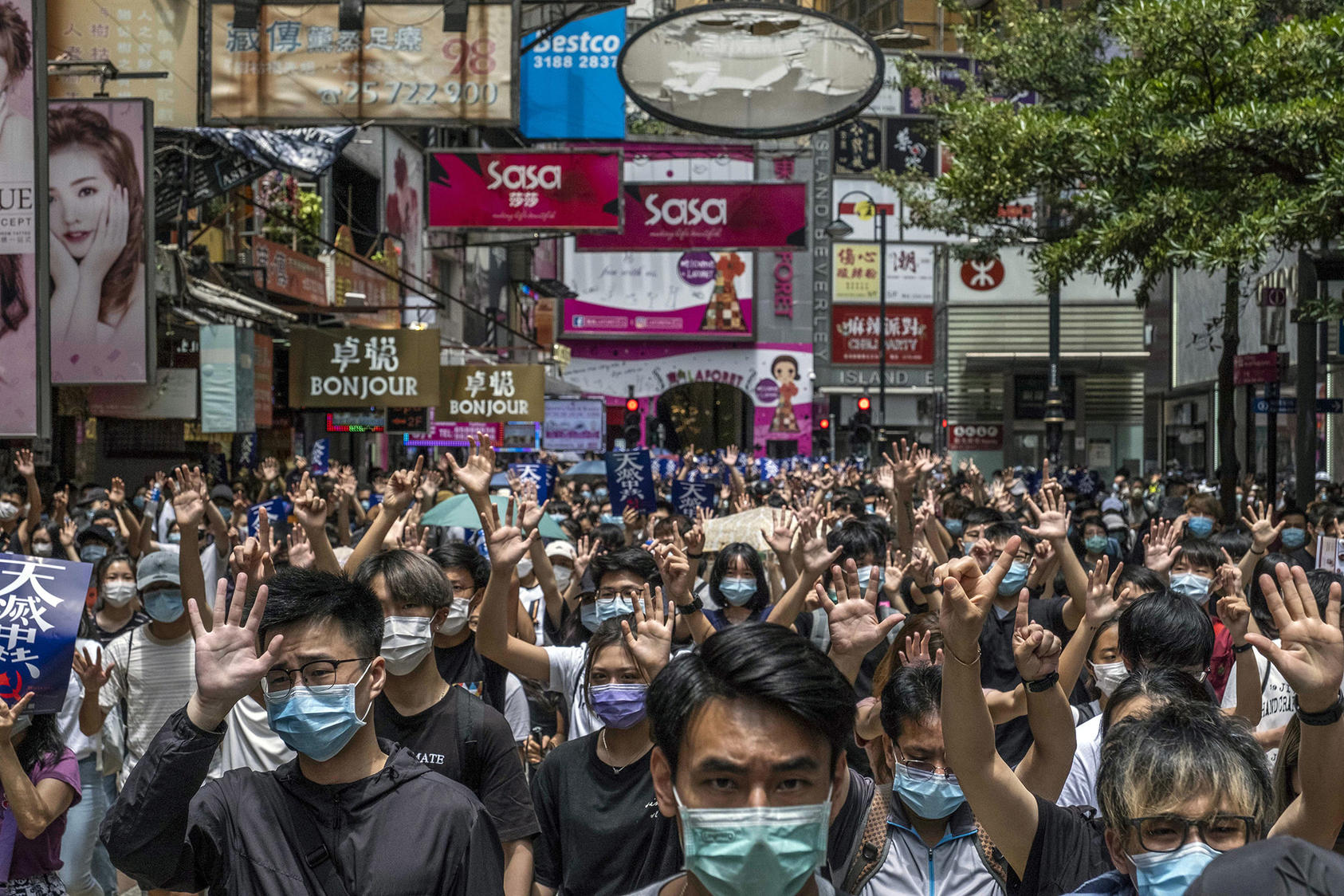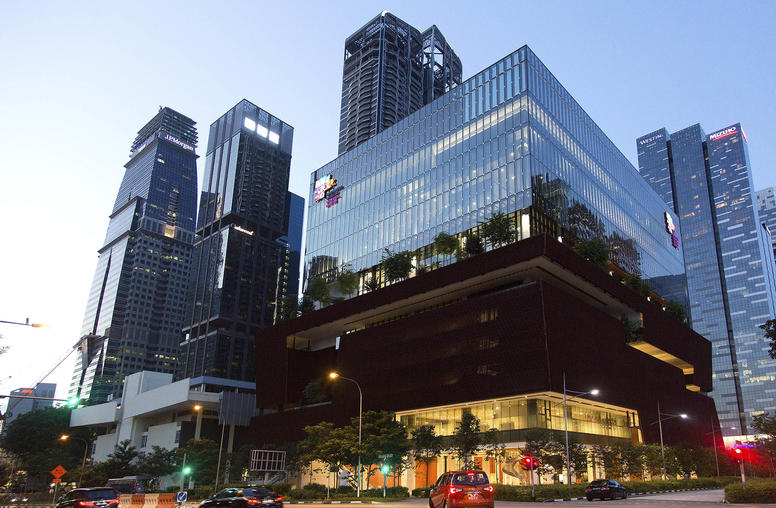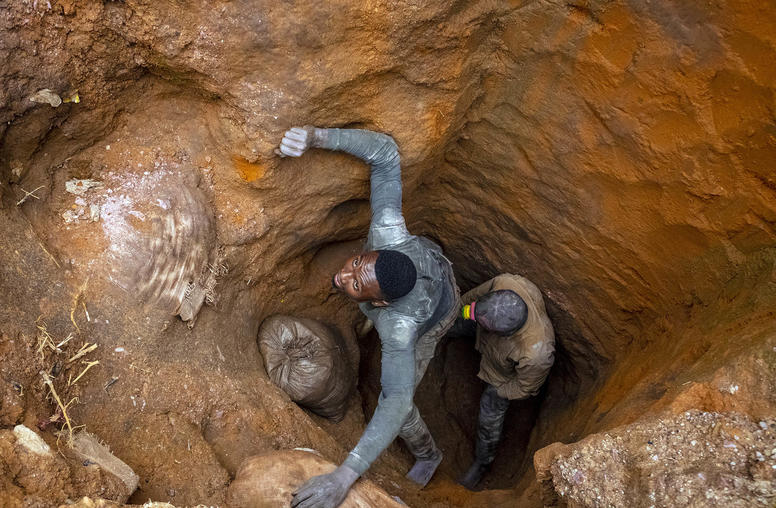Beijing Legislation Reignites Hong Kong Protests
Despite coronavirus restrictions, demonstrators push back on China’s proposal to crackdown on dissent.
In Hong Kong, protesters have once again taken to the streets to push back against China’s efforts to assert further control over the territory. After a year of intense demonstrations calling for greater autonomy from the mainland, Hong Kong is now facing proposed legislation from Beijing that would broadly curtail citizens’ rights and freedoms. USIP’s Patricia Kim and Rachel Vandenbrink examine the proposed legislation, how the coronavirus pandemic is affecting the situation, and what the U.S. can do in response.

How does Beijing’s planned legislation tighten China’s grip over Hong Kong?
Vandenbrink: Last week China’s National People’s Congress (NPC), Beijing’s rubber-stamp legislative body, introduced a measure to impose sweeping national security legislation in Hong Kong. The measure, approved today, paves the way for the NPC in Beijing to draft and enact legislation that would punish acts of sedition, subversion, terrorism, and “foreign interference” in Hong Kong, and that would formally allow the mainland’s national security agencies to operate in the territory. The move bypasses Hong Kong’s legislature, stripping away another layer of the political autonomy that Hong Kong has enjoyed under the “one country, two systems” model in place since the 1997 handover. It also signals Beijing’s impatience with working through proxies in Hong Kong, making clear that if Hong Kong’s officials won’t take steps to prevent protesters from challenging Beijing’s control, Beijing will.
Article 23 of Hong Kong’s Basic Law, the region’s de facto constitution, requires Hong Kong to enact its own laws to prohibit acts of treason, secession, and sedition against the mainland government. Beijing argues that Hong Kong has failed to do so, and therefore the central government must. Under the newly approved measure, the National People’s Congress Standing Committee in Beijing will draft new national security legislation for Hong Kong, to be inserted into Annex III of the Basic Law—the list of national laws Hong Kong is not exempt from. The new security legislation is expected to be formulated and passed by the NPC as early as June or July. After that, like other legislation in Annex III, it can become Hong Kong law through promulgation by the Chief Executive Carrie Lam without going through Hong Kong’s Legislative Council.
Process aside, the resulting legislation could further tighten Beijing’s control by using broad national security justifications to criminalize acts that challenge its authority. Moreover, according to last week’s decision, the planned legislation will include authorization for Beijing’s national security organs to set up agencies in Hong Kong. It won’t be clear until the final legislation is drafted, but new security legislation is expected to make it easier for Beijing to curb voices of dissent—including those protesting against the new legislation itself.
With all of its priorities amid the global pandemic, why has Beijing sought to move forward now with this new law?
Kim: Beijing has long been alarmed by growing anti-government protests and calls for democracy in Hong Kong, from the 2014 Umbrella Movement to the mass protests that shook the city last year in response to a controversial extradition bill and concerns about the continued erosion of Hong Kong’s autonomy. Beijing asserts these movements have "undermined political and public security in Hong Kong,” “threatened China's national sovereignty, unity and territorial integrity,” and pose a “major and imminent danger.” The national security law is seen as an urgent and necessary tool by Beijing to stifle activists and future protests, and to ultimately check threats to the Chinese Communist Party’s (CCP) authority. In terms of timing, the measure to formulate the legislation was introduced as China’s NPC opened last Friday. This move follows recent crackdowns on pro-democracy activists and lawmakers in Hong Kong amid concerns of another wave of protests as the city loosens coronavirus-related restrictions and looks ahead to Legislative Council elections in the fall.
Given COVID-19 restrictions, what does Sunday’s protest signal about protesters’ views on the plans for the new legislation? How has the pandemic affected the protest movement?
Vandenbrink: It is not surprising that protests have stepped up again as COVID-19 restrictions in the city ease, but it is significant that Hong Kongers are defying a ban on public gatherings and a swift police response to register their anger with the planned legislation. Months of demonstrations over an extradition law quieted down this year after opposition wins in November elections and concerns of COVID-19 spread emerged. Hong Kong has managed to largely stave off local transmission of the virus and has not been hit by the pandemic as hard as the mainland due to implementation of strict social distancing measures, including a ban on public gatherings of more than four people. In May, Hong Kong relaxed the ban to gatherings of up to eight and began easing other restrictions on closure of businesses and recreational facilities. Street protests had started up again before the NPC measure, but this week’s demonstrations drew thousands and were the first on a large scale since the outbreak of the pandemic. They were originally planned as a protest over a different issue—a bill in Hong Kong’s legislature that would criminalize disrespect of China’s national anthem—but after the NPC announcement last week, thousands rallied to the cause, with police arresting more than 300 on Wednesday.
Public demonstrations like this week’s are not the only way Hong Kongers have sustained the protest movement amid concerns about gatherings that could spread the virus. Throughout the spring, activists continued to meet and discuss online and organized boycotts of pro-China businesses. Some have accused Hong Kong officials of using the virus as a pretext to limit protests through the public gatherings ban, such as for next week’s annual June 4 Tiananmen Square anniversary vigil, for which activists have this year asked people to light candles near their homes instead of in the usual Victoria Park.
How has the United States responded to the new legislation? What policy options should the United States consider?
Kim: After China signaled its intention to impose a new national security law on Hong Kong last week, senior White House officials condemned Beijing’s moves, warning the United States would consider imposing sanctions on Chinese officials and businesses and may revoke Hong Kong’s “special status,” which grants the city preferential trade and commercial treatment. The Hong Kong Human Rights and Democracy Act, passed last November by the U.S. Congress, requires the State Department to certify that Hong Kong maintains sufficient autonomy from the mainland to justify its special status. This Wednesday, the U.S. State Department released a statement declaring Secretary of State Mike Pompeo had “certified to Congress” that Hong Kong no longer warrants special treatment under U.S. laws as “no reasonable person can assert today that Hong Kong maintains a high degree of autonomy from China …” While the certification itself does not trigger any specific policy measures, Hong Kong may lose its preferential tariff rates and visa privileges, and face other restrictive trade measures currently imposed on the mainland.
Despite facing U.S. condemnation and punitive measures, Beijing is unlikely to reverse course. As discussed above, Chinese leaders see the new national security law as essential for preserving control of Hong Kong and countering threats to the CCP’s authority—and will likely absorb significant economic and reputational costs in service of such core interests. Moreover, as experts have pointed out, revoking Hong Kong’s special status could devastate its economy, “speed the conversion of China’s most free city into just another provincial capital,” and may end up “martyring it rather than saving it.”
Nonetheless, the United States should signal to China and the rest of the world that it is watching and concerned, and that Beijing cannot erode democratic norms without consequence. Washington should work with allies and partners to coordinate judiciously targeted sanctions and diplomatic messaging, among other measures. This coordination will need to be handled carefully, however, so as not to create the impression that Washington is simply enlisting partners in a “new Cold War” against Beijing. This will discourage active participation by many states who do not want to choose between the two countries, and undermine the ultimate message that should be channeled to Beijing, the people of Hong Kong, and others seeking to advance democratic norms around the world: that a coalition of concerned states are taking a principled and united stance in defense of democracy, freedom, and rule of law that their respective citizens cherish and will not simply standby.



